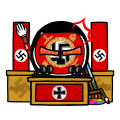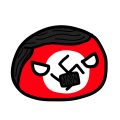Hitlerism: Difference between revisions
(→Trivia) |
No edit summary |
||
| Line 8: | Line 8: | ||
|Alignments = <div style="overflow:auto; height:auto; max-height:100px; background:transparent;">{{Info/Fas}} | |Alignments = <div style="overflow:auto; height:auto; max-height:100px; background:transparent;">{{Info/Fas}} | ||
|Place of Origin = [[File:Weimar Republic-icon.png]] [[Weimar Republic]] | |Place of Origin = [[File:Weimar Republic-icon.png]] [[Weimar Republic]] | ||
|Influenced By = <div style="overflow:auto; height:auto; max-height:100px; background:transparent;">[[File: | |Influenced By = <div style="overflow:auto; height:auto; max-height:100px; background:transparent;">[[File:Auth-icon.png]] [[Authoritarianism]]<br>[[File:Imp-icon.png]] [[Imperialism]]<br>[[File:AntiCap-icon.png]] [[Anti-Capitalism]]<br>[[File:AntiDem-icon.png]] [[Anti-Democracy]]<br>[[File:AntiMarx-icon.png]] [[Anti-Marxism]]<br>[[File:AntiJew-icon.png]] [[Anti-Semitism]]<br>[[File:Mach-icon.png]] [[Machiavellianism]]<br>[[File:Mediacracy-icon.png]] [[Mediacracy]]<br>[[File:CathTheo-icon.png]] [[Catholic Theocracy]] (formerly)<br>[[File:Romanticism-icon.png]] [[Romanticism]] (allegedly) | ||
|Influenced = [[File:Nazi-icon.png]] [[Nazism]] | |Influenced = [[File:Nazi-icon.png]] [[Nazism]] | ||
|Notable People = | |Notable People = | ||
Revision as of 14:32, 10 October 2024
“
I am Adolf Hitler, commander of thee ![]() Third Reich!
Third Reich!
Little known fact, also dope on the mic!
— ![]() Adolf Hitler (not)
Adolf Hitler (not)
Hitlerism, also known as Adolf Hitler Thought, refers to the ideology and policies associated with Adolf Hitler, the leader of the ![]() National Socialist German Workers' Party (NSDAP), commonly known as the Nazi Party. This doctrine encompasses a range of beliefs and principles that guided
National Socialist German Workers' Party (NSDAP), commonly known as the Nazi Party. This doctrine encompasses a range of beliefs and principles that guided ![]() Nazi Germany from 1933 to 1945, during Hitler's dictatorship. He is known for being the predecessor and leader of the
Nazi Germany from 1933 to 1945, during Hitler's dictatorship. He is known for being the predecessor and leader of the ![]() Nazis. He is sometimes also seen as a branch of
Nazis. He is sometimes also seen as a branch of ![]() Nazism.
Nazism.
Hitler is an extremely controversial character, he is often portrayed as a man of pure evil. Due to this, he often appears in “dark humor” and many other internet pop culture.
History
Early on, Hitler was found of the idea of ![]() German nationalism, though he himself is an
German nationalism, though he himself is an ![]() Austrian.
Austrian.
Adolf Hitler’s rise to power began with his joining the ![]() German Workers' Party (DAP) in 1919. Impressed by the party's
German Workers' Party (DAP) in 1919. Impressed by the party's ![]() nationalist and
nationalist and ![]() anti-Semitic ideas, Hitler quickly rose within its ranks due to his oratory skills and propaganda talents. By 1921, he had become the leader of the newly renamed
anti-Semitic ideas, Hitler quickly rose within its ranks due to his oratory skills and propaganda talents. By 1921, he had become the leader of the newly renamed ![]() National Socialist German Workers' Party (NSDAP or Nazi Party). His initial attempt to seize power through the 1923 Beer Hall Putsch failed, leading to his imprisonment. During his brief time in prison, he wrote “Mein Kampf,” outlining his ideology and future plans for
National Socialist German Workers' Party (NSDAP or Nazi Party). His initial attempt to seize power through the 1923 Beer Hall Putsch failed, leading to his imprisonment. During his brief time in prison, he wrote “Mein Kampf,” outlining his ideology and future plans for ![]() Germany.
Germany.
Upon his release in 1925, Hitler focused on rebuilding the ![]() Nazi Party and gaining power through legal political means. The Great Depression of 1929 significantly increased the party's support, as Hitler promised economic and political stability. By 1932, the
Nazi Party and gaining power through legal political means. The Great Depression of 1929 significantly increased the party's support, as Hitler promised economic and political stability. By 1932, the ![]() Nazis were the largest party in the
Nazis were the largest party in the ![]() Reichstag (parliament), and in 1933, Hitler was appointed Chancellor of
Reichstag (parliament), and in 1933, Hitler was appointed Chancellor of ![]() Germany. He quickly consolidated power, passing the Reichstag Fire Decree and the Enabling Act, which gave him dictatorial powers. By 1934, after the death of president
Germany. He quickly consolidated power, passing the Reichstag Fire Decree and the Enabling Act, which gave him dictatorial powers. By 1934, after the death of president ![]() Hindenburg, Hitler had merged the positions of chancellor and president, becoming the supreme leader of
Hindenburg, Hitler had merged the positions of chancellor and president, becoming the supreme leader of ![]() Germany.
Germany.
Hitler's rule led to the aggressive expansion of the ![]() German Third Reich and the onset of World War II in 1939, starting with the invasion of
German Third Reich and the onset of World War II in 1939, starting with the invasion of ![]() Poland. His regime implemented the Holocaust, resulting in the mass extermination of six million
Poland. His regime implemented the Holocaust, resulting in the mass extermination of six million ![]() Jews and millions of other persecuted groups. As the war turned against
Jews and millions of other persecuted groups. As the war turned against ![]() Germany, Hitler retreated to his Führerbunker in
Germany, Hitler retreated to his Führerbunker in ![]() Berlin. Facing imminent defeat, he committed suicide on April 30, 1945. His death marked the end of the
Berlin. Facing imminent defeat, he committed suicide on April 30, 1945. His death marked the end of the ![]() Nazi regime, and
Nazi regime, and ![]() Germany surrendered shortly afterward, leaving a legacy of unprecedented destruction and horror.
Germany surrendered shortly afterward, leaving a legacy of unprecedented destruction and horror.
Beliefs
 Racial Purity and Anti-Semitism
Racial Purity and Anti-Semitism 
Central to Hitlerism is the belief in the superiority of the ![]() Aryan race, particularly the
Aryan race, particularly the ![]() Germanic peoples, and the inferiority of other races. This ideology justified the systemic persecution and extermination of
Germanic peoples, and the inferiority of other races. This ideology justified the systemic persecution and extermination of ![]() Jews, whom Hitler and the
Jews, whom Hitler and the ![]() Nazis scapegoated for
Nazis scapegoated for ![]() Germany's problems and considered an existential threat.
Germany's problems and considered an existential threat.
 Hierarchical Society
Hierarchical Society 

Hitler was opposed to ![]() Marxism,
Marxism, ![]() Capitalism, and
Capitalism, and ![]() Democracy, viewing them as threats to the
Democracy, viewing them as threats to the ![]() Nazi vision of a racially pure and
Nazi vision of a racially pure and ![]() hierarchically organized society. He believed that
hierarchically organized society. He believed that ![]() Marxism, particularly its focus on class struggle and internationalism, was a tool of
Marxism, particularly its focus on class struggle and internationalism, was a tool of ![]() Jewish influence aimed at undermining the
Jewish influence aimed at undermining the ![]() German nation and
German nation and ![]() Aryan race. Hitler's
Aryan race. Hitler's ![]() anti-Semitic worldview led him to equate
anti-Semitic worldview led him to equate ![]() Marxism with a
Marxism with a ![]() Jewish conspiracy, which he sought to eradicate through aggressive policies and ultimately, the Holocaust.
Jewish conspiracy, which he sought to eradicate through aggressive policies and ultimately, the Holocaust.
![]() Capitalism, in Hitler's eyes, was another manifestation of
Capitalism, in Hitler's eyes, was another manifestation of ![]() Jewish control, seen as promoting individualism, greed, and economic exploitation that destabilized the social order. While the
Jewish control, seen as promoting individualism, greed, and economic exploitation that destabilized the social order. While the ![]() Nazi regime tolerated and utilized
Nazi regime tolerated and utilized ![]() capitalist structures to some extent, especially to fund its war machine and industrial growth, it did so under strict state control, ensuring that economic power aligned with the goals of the regime rather than the interests of private capital.
capitalist structures to some extent, especially to fund its war machine and industrial growth, it did so under strict state control, ensuring that economic power aligned with the goals of the regime rather than the interests of private capital.
![]() Democracy was rejected by
Democracy was rejected by ![]() Hitler as weak and decadent, incapable of providing the strong, unified leadership he deemed necessary for
Hitler as weak and decadent, incapable of providing the strong, unified leadership he deemed necessary for ![]() Germany's revival. He saw
Germany's revival. He saw ![]() democratic governance as inherently corrupt and inefficient, diluting national strength by allowing diverse, and in his view, inferior elements to have a say in the nation's future. In place of
democratic governance as inherently corrupt and inefficient, diluting national strength by allowing diverse, and in his view, inferior elements to have a say in the nation's future. In place of ![]() democracy, Hitler promoted a
democracy, Hitler promoted a ![]() totalitarian state where power was centralized in the Führer, with absolute authority to guide the nation toward its destiny of
totalitarian state where power was centralized in the Führer, with absolute authority to guide the nation toward its destiny of ![]() territorial expansion,
territorial expansion, ![]() racial purity, and
racial purity, and ![]() military dominance.
military dominance.
 Life in the society
Life in the society
If someone said something bad about or is a threat to Hitler or the ![]() Nazi Party,
Nazi Party, ![]() Gestapo (German secret police) and
Gestapo (German secret police) and ![]() SS would attack and imprison them.
SS would attack and imprison them.
In schools, Hitler’s portrait is in every classroom’s wall. Mein Kampf is an official history book, and all teachers had to join the ![]() Nazi Party to be able to spread
Nazi Party to be able to spread ![]() Nazi beliefs and indoctrinate students, as they learned to respect the Führer (
Nazi beliefs and indoctrinate students, as they learned to respect the Führer (![]() German word for leader).
German word for leader).
In women’s society, they were all expected to give up on their jobs and look after their families. If they have 8 children, they would be awarded a medal. They are also supposed to wear traditional peasant clothes and flag shoes, they were not allowed to dye their hairs or smoke.
 Economic Control and Autarky
Economic Control and Autarky 
While not strictly an economic theory, Hitlerism included elements of state control over the economy to ensure it served the interests of the nation and the war effort. This involved policies aimed at achieving self-sufficiency (![]() Autarky) and the mobilization of resources for rearmament and military expansion.
Autarky) and the mobilization of resources for rearmament and military expansion.
Life of Adolf Hitler
Hitler was born on 20 April, 1889. He had 3 older brothers, though they all died before he was born. His father was an alcoholic, and this behavior had a significant impact on the household, contributing to a difficult and often abusive family environment. Hitler’s mother had tried to protect him but she was too scared of his father. Hitler beated his teachers up and got expelled from many schools. Young Hitler was also very interested in ![]() German nationalism, despite being in
German nationalism, despite being in ![]() Austria. When his father died, he had lived a good life with his mother. Sadly she died from breast cancer.
Austria. When his father died, he had lived a good life with his mother. Sadly she died from breast cancer.
He dreamed of becoming an artist, so he joined in Academy of Art. But his master said that his painting isn’t good enough. He said that it lacked empathy and emotion. He got rejected from art school 2 times, making him deeply upset, as his artistic aspirations were crushed. Disillusioned and bitter, he turned to politics as a means to channel his frustrations and ambitions.
In 1913, Hitler moved to ![]() Munich,
Munich, ![]() Germany, where he continued to struggle financially, working odd jobs and living in a men's hostel. When World War I broke out, he eagerly enlisted in the
Germany, where he continued to struggle financially, working odd jobs and living in a men's hostel. When World War I broke out, he eagerly enlisted in the ![]() German Army, seeing the war as an opportunity to prove his worth and serve the nation he idolized. He served as a soldier on the Western Front and was wounded twice.
German Army, seeing the war as an opportunity to prove his worth and serve the nation he idolized. He served as a soldier on the Western Front and was wounded twice. ![]() Hitler was deeply affected by
Hitler was deeply affected by ![]() Germany’s defeat in 1918, and like many others, he felt betrayed by the German government, which he believed had stabbed the country in the back by signing the Treaty of Versailles.
Germany’s defeat in 1918, and like many others, he felt betrayed by the German government, which he believed had stabbed the country in the back by signing the Treaty of Versailles.
Trivia
- Hitler asked for a longer visor on his cap in order to protect his eyes from hyper photo sensibility.
- While Hitler is planning his next offensive, a fly annoys him. Furious at this pest, he demands one of his confidants to dispatch the fly. But the aide decided to crack a joke and says, "This is an airborne object. This is better handled by the Luftwaffe." The aide is then sent to the Eastern Front.
Hitler probably was just jealous of how good the joke was
Quotes
“
Make the lie big, make it simple, keep saying it, and eventually they will believe it.
— A quote commonly attributed to ![]() Adolf Hitler
Adolf Hitler
“
I wanted to paint, they rejected me. So I painted the entirety of Europe red.
— ![]() Adolf Hitler (not)
Adolf Hitler (not)
“
I said I wanted a glass of juice, NOT TO GAS THE ![]() JEWS!
JEWS!
— ![]() Adolf Hitler (not)
Adolf Hitler (not)
How do draw

Hitlerism has a drawing rating of hard.
- Draw a ball.
- Fill the ball with red.
- Draw a white border inside and around the ball.
- Draw a thinner black border inside and around the white border.
- Draw a white circle in the middle of the ball.
- Draw a Nazi Swastika in the white circle.
- Draw a fancy circle in yellow around the white circle. Border the yellow with gold.
- Draw four eagles holding Nazi Swastikas around the circle.
- Add the eyes, Hitler’s cap and a toothbrush mustache. You’re! done.
| Color Name | HEX | |
|---|---|---|
| Red | #DD0000 | |
| Black | #000000 | |
| White | #FFFFFF | |
| Yellow | #FDE77B | |
| Gold | #843803 | |
Gallery
-
Portrait, no hat
-
Nazi flag
See Also
| States | |
|---|---|
| Cities | |
| Historical Entities | |
| German Ideologies | |
| Political Parties | |
| Military | |
| Languages | |
or else… | |




